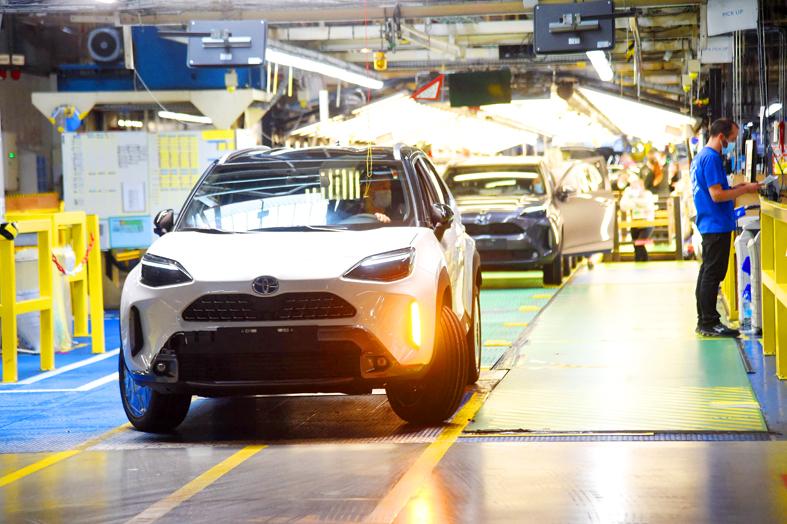Toyota Motor Corp is to reduce global production by 40 percent next month, the last major automaker to cut production due to critical shortages of semiconductors, the Nikkei business newspaper reported yesterday.
Toyota has fared better than rivals, having built a larger stockpile of chips due to a business continuity plan revamped in the wake of the 2011 Tohoku earthquake and tsunami.
However, a resurgence in COVID-19 cases across Asia has compounded the semiconductor crunch.

Photo: AFP
Shares in the world’s largest automaker by sales volume slid on the report, ending down 4.4 percent in its largest daily drop since December 2018, pulling the benchmark Nikkei average to a seven-month low.
Toyota had been aiming to manufacture about 900,000 vehicles next month, but has reduced that to about 500,000, the newspaper said.
Toyota this month said that it was facing an unpredictable business environment due to fresh COVID-19 cases in emerging economies, the semiconductor shortage and soaring material prices.
However, the automaker maintained its forecast to sell 8.7 million vehicles worldwide for the fiscal year ending in March next year.
Starting early next month, Toyota would temporarily suspend production lines at domestic factories, including its Takaoka plant in Aichi Prefecture, the newspaper said.
Production in North America, China and Europe are also likely to be scaled back by tens of thousands of units, it said.
The automaker halted assembly lines at some domestic factories from late last month to early this month, including its Tahara plant, due to a surge in COVID-19 infections in Vietnam, which constrained the supply of parts, the newspaper said.
A person familiar with the matter this month told Reuters that Toyota had suspended production at one assembly line in Guangzhou, China, which the automaker operates with its Chinese joint-venture partner Guangzhou Automobile Group Co Ltd (廣汽集團).
In Thailand as well, Toyota last month suspended production at three factories due to a COVID-19-related parts shortage.

South Korea’s equity benchmark yesterday crossed a new milestone just a month after surpassing the once-unthinkable 5,000 mark as surging global memory demand powers the country’s biggest chipmakers. The KOSPI advanced as much as 2.6 percent to a record 6,123, with Samsung Electronics Co and SK Hynix Inc each gaining more than 2 percent. With the benchmark now up 45 percent this year, South Korea’s stock market capitalization has also moved past France’s, following last month’s overtaking of Germany’s. Long overlooked by foreign funds, despite being undervalued, South Korean stocks have now emerged as clear winners in the global market. The so-called “artificial intelligence

NEW IDENTITY: Known for its software, India has expanded into hardware, with its semiconductor industry growing from US$38bn in 2023 to US$45bn to US$50bn India on Saturday inaugurated its first semiconductor assembly and test facility, a milestone in the government’s push to reduce dependence on foreign chipmakers and stake a claim in a sector dominated by China. Indian Prime Minister Narendra Modi opened US firm Micron Technology Inc’s semiconductor assembly, test and packaging unit in his home state of Gujarat, hailing the “dawn of a new era” for India’s technology ambitions. “When young Indians look back in the future, they will see this decade as the turning point in our tech future,” Modi told the event, which was broadcast on his YouTube channel. The plant would convert

‘SEISMIC SHIFT’: The researcher forecast there would be about 1.1 billion mobile shipments this year, down from 1.26 billion the prior year and erasing years of gains The global smartphone market is expected to contract 12.9 percent this year due to the unprecedented memorychip shortage, marking “a crisis like no other,” researcher International Data Corp (IDC) said. The new forecast, a dramatic revision down from earlier estimates, gives the latest accounting of the ongoing memory crunch that is affecting every corner of the electronics industry. The demand for advanced memory to power artificial intelligence (AI) tasks has drained global supply until well into next year and jeopardizes the business model of many smartphone makers. IDC forecast about 1.1 billion mobile shipments this year, down from 1.26 billion the prior

People stand in a Pokemon store in Tokyo on Thursday. One of the world highest-grossing franchises is celebrated its 30th anniversary yesterday.